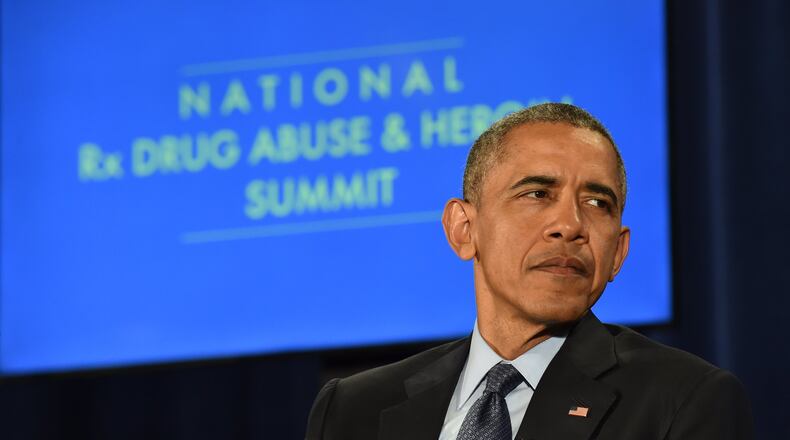President Barack Obama said more must be done to combat prescription painkiller addictions and the stigma surrounding them, using a summit in Atlanta on Tuesday to announce new measures against a drug overdose epidemic raging across Georgia and the nation.
Speaking at a panel discussion with Dr. Sanjay Gupta of CNN and two people recovering from drug problems, Obama said more people now die every day from drug overdoses than from traffic crashes.
“When you look at the staggering statistics in terms of lives lost, productivity impacted, the cost to communities — but most importantly the cost to families — from this epidemic of opioids abuse, it has to be something that is right up there at the top of our radar screen,” Obama said.
Politics followed the president into Atlanta. Aboard Air Force One on the way from Washington to Georgia, reporters asked White House press secretary Josh Earnest about the "religious liberty" legislation Gov. Nathan Deal vetoed this week, as well as a new North Carolina statute that eliminates anti-discrimination protections for gays.
“It’s the president’s strong view that we can take all the necessary steps to protect religious freedom without giving people the approval to discriminate against people because of who they love,” Earnest told reporters.
Obama himself dipped into politics Tuesday when he gently scolded an unnamed governor for not expanding Medicaid under the Affordable Care Act.
On Monday, the Obama administration released 2014 statistics showing there were 159,000 uninsured Georgians who had mental illnesses or substance abuse disorders, and whose incomes would qualify them for Medicaid if the program were expanded in the Peach State.
Although the federal government would cover most of the cost of expansion, Deal has rejected it, saying Medicaid is already overtaxed and the state can’t afford to make it even bigger.
“If you get a situation in which somebody is in pain initially because of a disc problem, they may not have health insurance because maybe the governor didn’t expand Medicaid like they should have under the ACA,” Obama said to cheers. “They go to a doctor one time when the pain gets too bad. The doctor is prescribing painkillers. They run out and it turns out it is cheaper to get heroin on the street than it is to try to figure out how to refill that prescription — you have a problem.”
New Weapons In Drug Fight
Obama spoke to about 2,000 people gathered at the National Rx Drug Abuse & Heroin Summit, which is focused on fighting a prescription painkiller and heroin overdose epidemic that killed more than 28,000 people in 2014, more than any year on record. At least half of those deaths involved prescription drugs.
Obama highlighted a proposed rule that would allow doctors prescribing buprenorphine for drug addictions to increase the number of patients they see from 100 to 200. He pointed out $94 million in new federal funding to expand medication-assisted treatment at 271 community health centers across the country.
Further, he signed a new memorandum Tuesday, directing the creation of an interagency task force for expanding access to mental health and substance abuse treatment. And he announced $11 million in funding for states to buy a drug overdose prevention medication called naloxone and to train emergency workers how to use it.
Also on Tuesday, 60 medical schools — including Mercer University in Macon and the Suwanee campus of the Philadelphia College of Osteopathic Medicine — announced they will begin requiring students to take some form of education in line with new federal guidelines for prescribing painkillers.
A Stigma Against Addicts?
One of the panelists who appeared with Obama on Tuesday was Crystal Oertle, a 35-year-old mother of two children from Ohio. She abused Vicodin and OxyContin, then switched to heroin, using drugs in her home while her children were there or at school. She stole from department stores to support her addictions.
“It was so much a part of my life,” she said. “It is crazy to think about now — the things that I did. But it was necessary or I would not have been able to function.”
Oertle said she has been in recovery for about a year with the help of medication-assisted treatment and counseling. At the same time, Oertle said people like her face a powerful stigma. For example, probation officers, she said, don’t treat addicts as if they have a disease.
“It’s great to hear the president say ‘the disease of addiction.’ That is wonderful,” she said. “But there still is a stigma. For me, even coming here — and nobody here treated me badly or anything, but it is in the back of my mind.”
Obama quickly sought to comfort her, humorously interjecting: “If somebody treats Crystal badly, you have to talk to me. I have got the Secret Service, the U.S. armed forces. Don’t mess with her.”
“The most important thing we can do is to reduce demand for drugs,” he said earlier in the discussion. “And the only way that we reduce demand is if we are providing treatment and thinking about this as a public health problem and not just a criminal problem.”
About the Author
The Latest
Featured



